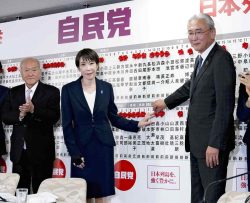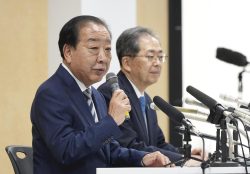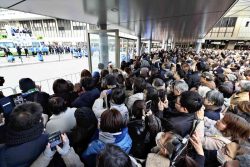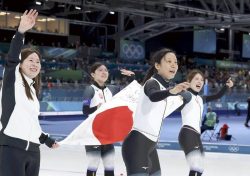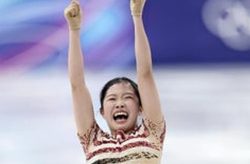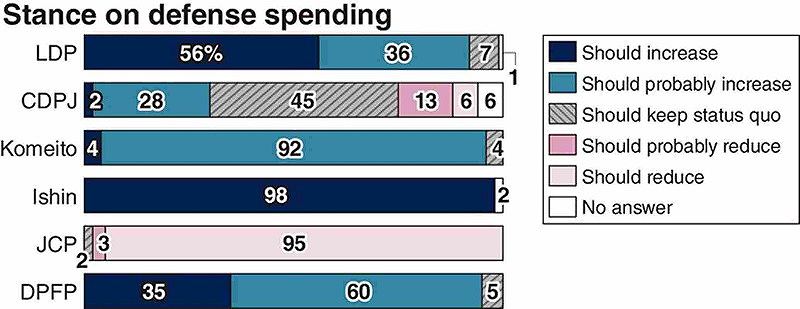
19:46 JST, June 30, 2022
“The economy and employment” is the most important issue for candidates running in the upcoming House of Councillors election, followed by “diplomacy and security,” according to a Yomiuri Shimbun survey.
Fifty percent of the candidates who responded said the economy and employment would be a priority area for them during the campaign for the July 10 election, edging the 45% of candidates who cited diplomacy and security. These figures apparently reflected the deteriorating security and economic situation triggered by Russia’s invasion of Ukraine earlier this year.
Candidates were permitted to select three issues in the survey, which was conducted from May 23, before the election was publicly announced. The survey received responses from 491, or 90.1%, of the 545 candidates.
The economy and employment was selected as the most important issue by candidates from four of nine surveyed political parties — the Liberal Democratic Party, Komeito, Nippon Ishin no Kai (Japan Innovation Party) and the Democratic Party for the People.
“Measures to combat rising fuel and other prices” ranked ninth on the list of issues and was chosen by 15% of candidates overall. However, this was the third-most important issue for candidates (38%) from the Constitutional Democratic Party of Japan, which has blasted the government’s efforts to address climbing prices.
The proportion of candidates who plumped for diplomacy and security was more than triple the 13% of candidates who did so in a survey conducted before the previous upper house election in 2019. However, the wording of the question in the surveys differed, which rules out a simple comparison. The ruling and opposition parties are locking horns over various aspects of this issue, including the LDP’s pledge to increase defense spending.
The survey found that 25% of candidates felt “making education free of charge” was a priority, placing this issue third overall. This was about double the 12% who selected it in the previous survey. Political parties are jostling over the expansion of financial aid and making schools free. Many parties trumpet policies to support families raising children, such as making efforts to reduce the length of waiting lists to enter child care facilities.
Only 9% of respondents said “dealing with the coronavirus pandemic” was a pressing election issue. This figure was 82% in a survey conducted before October’s House of Representatives election, but the issue has apparently plunged down the pecking order due to the wide increase in coronavirus vaccinations across Japan and the stable infection situation.
Debate is shifting from a focus on preventing infections from spreading, to balancing this with reopening the economy.
Twenty percent of candidates overall picked the Constitution, placing this issue fifth. Prime Minister Fumio Kishida, who also is LDP president, has indicated his intention to make constitutional revision a reality, but just 21% of LDP candidates included this issue in their top three. Overall, the supreme law was the fifth-highest issue for candidates from the main ruling party.
Parties split on key defense issues
When asked whether the defense budget should be increased, a clear majority of candidates from the LDP, Komeito, Ishin and DPFP said “yes” or “probably yes.” The Japanese Communist Party candidates overwhelmingly said defense expenditures should be cut, and CDPJ candidates were divided.
According to the survey, 92% of LDP candidates, 96% of Komeito candidates, 98% of Ishin candidates and 95% of DPFP candidates supported a higher defense budget. The ruling coalition of the LDP and Komeito see eye to eye on this issue, and the similar figures for the two opposition parties indicate they broadly agree with the ruling bloc on defense policy.
Ninety-eight percent of JCP candidates want defense spending cut, and the remaining 2% said the defense budget should stay at its current level. Among CDPJ candidates, 30% want this budget boosted, 19% want it trimmed, and 45% prefer its current level.
Japan’s defense budget currently hovers around 1% of gross domestic product. But when candidates who support a bigger defense budget were asked how much this expenditure should be increased, the results revealed clear difference between the parties.
Among LDP candidates, 1% supported a defense budget increase of “more than 3%,” 30% said “more than 2% but less than 3%,” and 55% said “more than 1% but less than 2%.”
However, just 13% of Komeito candidates wanted “more than 2% but less than 3%” and 65% leaned toward “more than 1% but less than 2%.”
Three percent of Ishin candidates said “more than 3%” and 5% said “more than 2% but less than 3%,” and 21% of DPFP candidates chose “more than 2% but less than 3%.”
The survey also sought candidates’ views on whether the Self-Defense Forces should possess the ability to destroy military facilities abroad, such as missile launch sites, for self-defense purposes. Eighty-seven percent of LDP respondents supported or leaned toward supporting the SDF having this counterstrike capability, as did 93% of Ishin and 60% of DPFP candidates. Only 21% of Komeito candidates favored possession of this capability, 29% opposed, and 50% gave no answer.
Among other parties, 92% of CDPJ candidates and 100% of JCP candidates opposed allowing the SDF to possess this capability.
COVID concern eases
According to the survey, 29% of candidates said economic activity should be given priority over measures intended to prevent the spread of coronavirus infections. This figure climbed to 69% when including the 40% of candidates who said economic activity “probably should” take precedence.
Giving priority to economic activity was the most common response of candidates from the LDP, Komeito, Ishin and the DPFP.
When “probably should” was combined with the “should” answers, the figure rose to 72% of LDP candidates, 92% of Komeito candidates, 98% of Ishin candidates and 100% of DPFP candidates. A noticeable split emerged among CDPJ candidates, with 42% saying priority should or probably should be given to economic activity, eclipsed by 44% who said infection prevention measures should or probably should take precedence. By contrast, 98% of JCP candidates said infection prevention measures should or probably should be the priority.
62% favor changing Constitution
Forty-four percent of candidates said they supported changing the Constitution, and 18% said the nation’s top law probably should be amended – a total of 62%. Among LDP candidates, 97% said the Constitution should or probably should be revised, as did 79% of Komeito candidates, 100% of Ishin candidates and 95% of DPFP candidates.
When pressed on which part of the Constitution should be changed, the most common answer — given by 86% of LDP candidates and 100% of Ishin candidates — was “stipulating the legal grounds for the SDF and the retention of armed forces for self-defense.” Every Ishin candidate also selected making education free.
Among Komeito candidates, the most common answers, each given by 32% of respondents, were “environmental rights of the individual” and “the right to know and privacy rights.” Fifty-eight percent of DPFP candidates, the largest percentage of this party, selected the inclusion of a clause that would give the Cabinet more powers in an emergency.
The ruling parties were split over whether the war-renouncing Article 9 should be revised: 96% of LDP candidates said it should, while 79% of Komeito candidates said it should not. Meanwhile, 100% of Ishin candidates and 85% of DPFP candidates supported changing Article 9.
Ninety percent of CDPJ candidates said the Constitution should not or probably should not be amended. Every JCP candidate was opposed to altering the nation’s supreme law.
Top Articles in Politics
-

Japan PM Takaichi’s Cabinet Resigns en Masse
-

LDP Wins Historic Landslide Victory
-

LDP Wins Landslide Victory, Secures Single-party Majority; Ruling Coalition with JIP Poised to Secure Over 300 seats (UPDATE 1)
-

CRA Leadership Election Will Center on Party Rebuilding; Lower House Defeat Leaves Divisions among Former CDPJ, Komeito Members
-

Japan Tourism Agency Calls for Strengthening Measures Against Overtourism
JN ACCESS RANKING
-

Japan Institute to Use Domestic Commercial Optical Lattice Clock to Set Japan Standard Time
-

Japan PM Takaichi’s Cabinet Resigns en Masse
-

Israeli Ambassador to Japan Speaks about Japan’s Role in the Reconstruction of Gaza
-

Man Infected with Measles May Have Come in Contact with Many People in Tokyo, Went to Store, Restaurant Around When Symptoms Emerged
-

Prudential Life Insurance Plans to Fully Compensate for Damages Caused by Fraudulent Actions Without Waiting for Third-Party Committee Review


